Bridging the Divide: Friendship Across Partisan Lines
This article is part of a series representing a collaboration between The Saturday Evening Post and AllSides. The purpose of the series is to take a divisive issue and explore not only the differences but also the commonalities on both sides of the debate.
What does a progressive woman from Berkeley, California have in common with a conservative man from small-town America? On paper, not much, but in the case of Joan Blades and John Gable, they share at least one thing — a deep desire to heal the political divide.
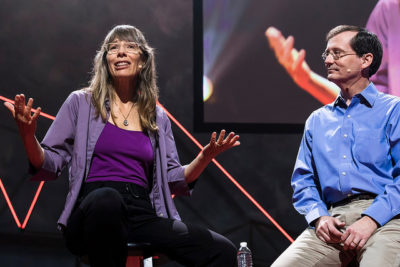
As they detail in their recent TED Talk, the two joined forces to build bridges across partisan landmines after a chance meeting on Capitol Hill. Blades is co-founder of Living Room Conversations, which provides a step-by-step guide to approaching political conversations with respectful dialogue. Gable’s company, AllSides, aims to cut through media bias by providing multiple perspectives on the contentious issues facing our country. Together, the two solidified an unlikely business partnership dedicated to popping filter bubbles — those pesky echo chambers that form when we’re only exposed to views we agree with.
But, more importantly, they forged a friendship.
One Sentence, a List of Email Addresses, and an Internet Connection
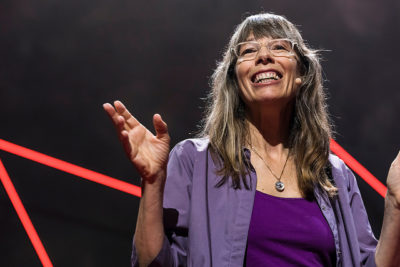
A longtime progressive and resident of the Bay Area, Blades started MoveOn.org, a website committed to social organizing. After a grassroots beginning, it soon became the standard-bearer for using online petitions for political advocacy. Her first project was a one-sentence appeal written during the Bill Clinton/Monica Lewinsky scandal: “Congress must immediately censure the president and move on to pressing issues facing the nation.”
It went viral.
Blades couldn’t have predicted the response. What began as an email to a few friends rapidly ballooned, with hundreds of thousands of Democrats and Republicans alike adding their names to the cause.
MoveOn now identifies as progressive. But while Blades’ initial vision was certainly political, in her mind, it wasn’t left, right, or anything in between.
“I didn’t think of it as bipartisan,” she said when recounting the organization’s first days. Rather, she saw it as something for “everyone” — a movement that transcended political affiliation entirely. After watching the impact she had with one sentence, a list of email addresses, and an internet connection, she was hooked.
A Conservative in a Dark Blue State
John Gable is also a resident of the Bay Area by way of Stearns, KY, a stark transition from deep red to dark blue territory. Following a stint in Republican politics where he worked for Senator Mitch McConnell (R-KY), the Republican National Committee, and former president George H.W. Bush, he transitioned to Silicon Valley.
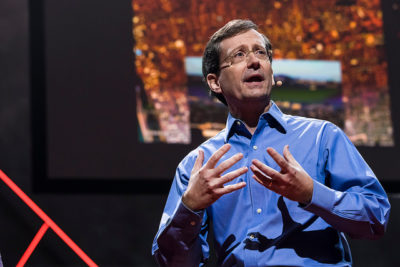
Uprooted from his conservative background, he found himself surrounded by people who disagreed with him on just about everything.
Well, almost everything. Like Blades, he’s a firm believer in technology’s potential to enact positive change. His foray onto the web was a bit less humble than his progressive counterpart’s, landing the role of product management lead at Netscape Navigator. The experience solidified his belief that this new terrain would provide enormous benefit to the global community. As one of the pioneers of the World Wide Web, he saw that the possibilities were endless.
Filter Bubbles
Twenty years later, both Blades and Gable have seen the societal benefits of technology first-hand, particularly with the internet’s unfettered access to limitless resources—knowledge, people, and otherwise. But they also concede that the pendulum may have swung too far, with online platforms increasingly sowing division. When they first met back in 2005, they teamed up to address this phenomenon.
“There’s just too much noise,” says Gable.
As content proliferates at a rapid pace, humans filter the majority out, and our technology self-selects so that we hear what we want to hear. Algorithms on popular websites analyze our political preferences and highlight news articles accordingly, eliminating opposing views. The “unfollow” button on social media provides an easy escape hatch when an idea we perceive as offensive comes into plain sight. And the 24-hour cable news cycle serves more to inflame than inform in hopes of maintaining a loyal customer base.
According to Gable, we’ve concocted the perfect recipe for an echo chamber, with a few extra dollops of partisan rancor.
Blades attests to the danger of filter bubbles, admitting that, just ten years ago, she “didn’t have any conservative friends.” Born and raised in Berkeley, she had never cultivated a relationship with someone outside of her progressive circle, a testament to the geographic and social factors that exacerbate the political divide.
So in 2010, she started Living Room Conversations, affording her the opportunity to engage in a national, civil dialogue with people of all different persuasions. And she says the best parts are the cross-partisan friendships that survive regardless of Trump or anti-Trump sentiment.
“This is one of the things I love about Joan,” says Gable. “She truly did burst her own filter bubble.”
Gable followed a different trajectory, as his filter bubble was forcefully popped after leaving Red America for the liberal coast. Frustrated by a pervasive unwillingness of some to understand the “other side,” he started AllSides.com. The site showcases a diverse array of voices on current events to expose people to the “full picture,” not just one slant.
Although Blades and Gable came from polar opposite backgrounds, they met in the middle.
A Polarized Nation
It goes without saying, but when the 2016 election came to a close, people were shocked. According to Gable and Blades, these filter bubbles deserve a great deal of the blame, with various areas of the country completely unaware of the others’ perspective. But even more so, the filter bubbles emphasize a sharp increase in polarization, where any slight divergence in political opinion is just cause for severing ties with friends or family.
As a result, many stay “in the closet” for fear of losing loved ones.
Listening Beyond Our Bubble
Following their talk at TEDWomen in New Orleans, a young woman approached the pair to share her own story. A liberal, she actively avoided political conversations with her conservative father, so vexed was she that a loved one subscribed to an agenda she viewed as oppressive.
But when the health care debate came to a head in recent months, she couldn’t hold her tongue any longer. As a supporter of progressive health care policies, she agonized over why her father would stand in the way of universal coverage. She broached the subject, but instead of asking to respond, she asked to listen—to understand.
“I feel it is my responsibility to provide for my family,” he said. “I want to provide for my family, and I feel like the government is taking that away from me.”
It wasn’t the answer she expected. It didn’t come from a place of malice or greed, but from a place of protection and love. It wasn’t oppressive; it was honest. It was human.
“The best way to be heard is to truly hear the other person first,” says Gable. “It all comes down to listening beyond our bubble.”
Blades wholeheartedly agrees. “Reaching out and having conversations with people that we don’t normally have conversations with is actually a really fun thing to do,” she says. Apart from the numerous emotional and intellectual benefits, she emphasizes that it’s an exciting, edifying process. “You make friends with people you otherwise wouldn’t and all of a sudden, so much more makes sense,” says Blades.
“It’s an adventure.”
Exclusive Interview with the Cast of AMC’s Mad Men
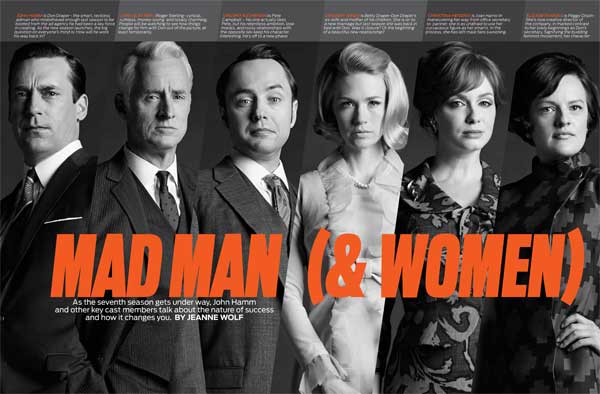
Mad Men has fanatic fans that talk and tweet about every episode, and, even if you don’t watch, it’s hard to escape the cultural impact of the acclaimed AMC series. It has created a flashback of fascination with the way things were in the ’60s—from fashion and design to the storm-tossed lives of hard-drinking men, without a hint of political correctness, and their glamorous women, all surrounded by clouds of cigarette smoke.
The show has brought to life the pre-feminist ’60s in the most raucously id-propelled environment—the win-at-all-costs world of advertising. While male bad behavior hasn’t diminished as the seasons have rolled by, the women in the cast have started coming into power and wreaking havoc of their own.
Don Draper is at the heart of this intoxicating mix of drama and comedy exploring the human condition as it feeds on success and descends into self-destructive failure. Portrayed by the impossibly handsome Jon Hamm, Draper is the linchpin of every episode. He forges ahead driven by the mantra “You’re born alone, and you die alone, and this world just drops a bunch of rules on top of you to make you forget those facts.” Hamm admits that six seasons of exploring a fascinating, often enigmatic and frequently unpredictable character has left its mark on him as well as every member of the cast. Whatever angst they portray on screen, they insist they are really sort of like members of a winning football team crossed with a loving family.
To find out more, The Saturday Evening Post invited key members of the cast along with series creator, Matt Weiner, and our West Coast editor, Jeanne Wolf, to an intimate get together of the Mad Men team.
JEANNE WOLF: I just learned that Executive Producer Matt Weiner recently held a cast party at which he showed your original audition tapes. Tell me how you’ve changed.
Jon Hamm: All of us have gone through seven years of life and when you add on top of that the experience of being on a show that has become as popular as this one has, it just amplifies everything. You can’t be seven years on the planet and not change.
John Slattery: You watch yourself on the audition tape and flashback, “Oh my God, I started out and my kid was six years old, and he’s in high school now.” You change, especially physically. I feel like I’m 100 years older than when we started. [Laughs.]
January Jones: Mad Men has been this stable background for everything else that has happened personally, and I’ve felt like I have a family around me to support me. Maybe the one negative thing in my life is that I’ve become more guarded as a person. But I’m not guarded on the set. I feel protected enough and safe enough to give everything I can every day.
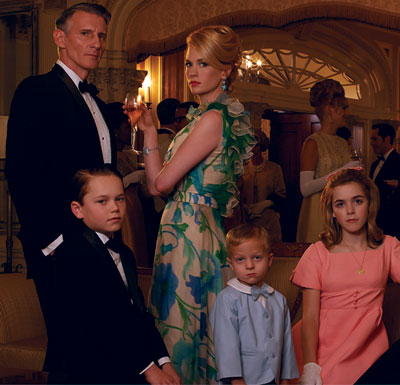
Christina Hendricks: When I saw my audition played back, I could tell that I was that girl who hadn’t booked an acting job in a year. Having a job is a huge thing. You get to wake up and not be terrified.
Vincent Kartheiser: On the day I auditioned, I thought I nailed it [laughs] because Matt asked me if I would be willing to change my hair.
Slattery: You mean “fix that haircut.” It looked like a hat.
Kartheiser: You guys are evil! Seriously, I was thinking, Isn’t there some good actor they could get to try out? I was very nervous because I loved the script. That makes it so much harder to audition.
Wolf: Let’s go back even further. How did the way you grew up affect who you are today?
To read the rest of Jeanne Wolf’s interview with the cast, pick up the March/April 2014 issue of The Saturday Evening Post on newsstands, or
Purchase the digital edition for your iPad, Nook, or Android tablet:

To purchase a subscription to the print edition of The Saturday Evening Post: 